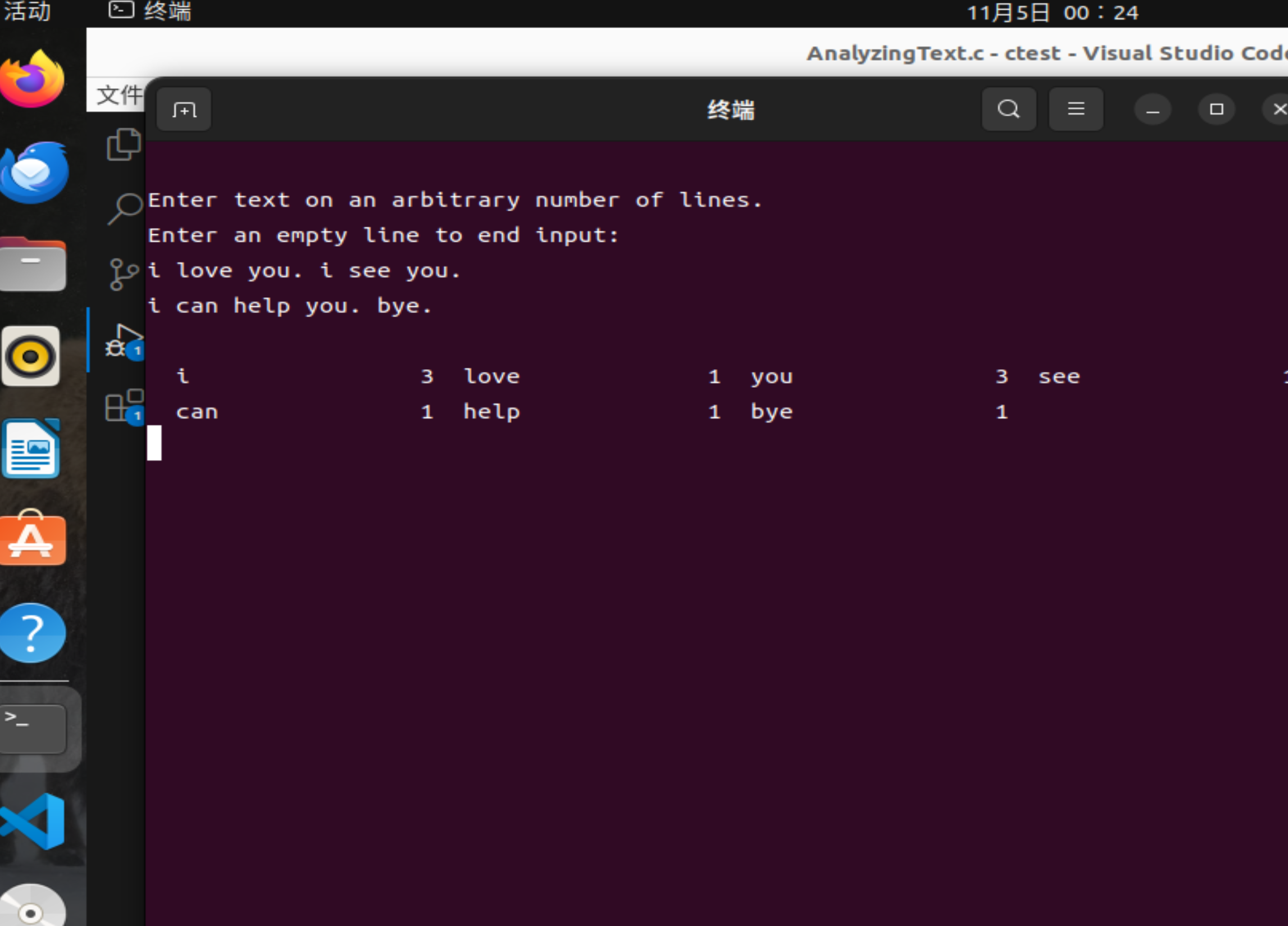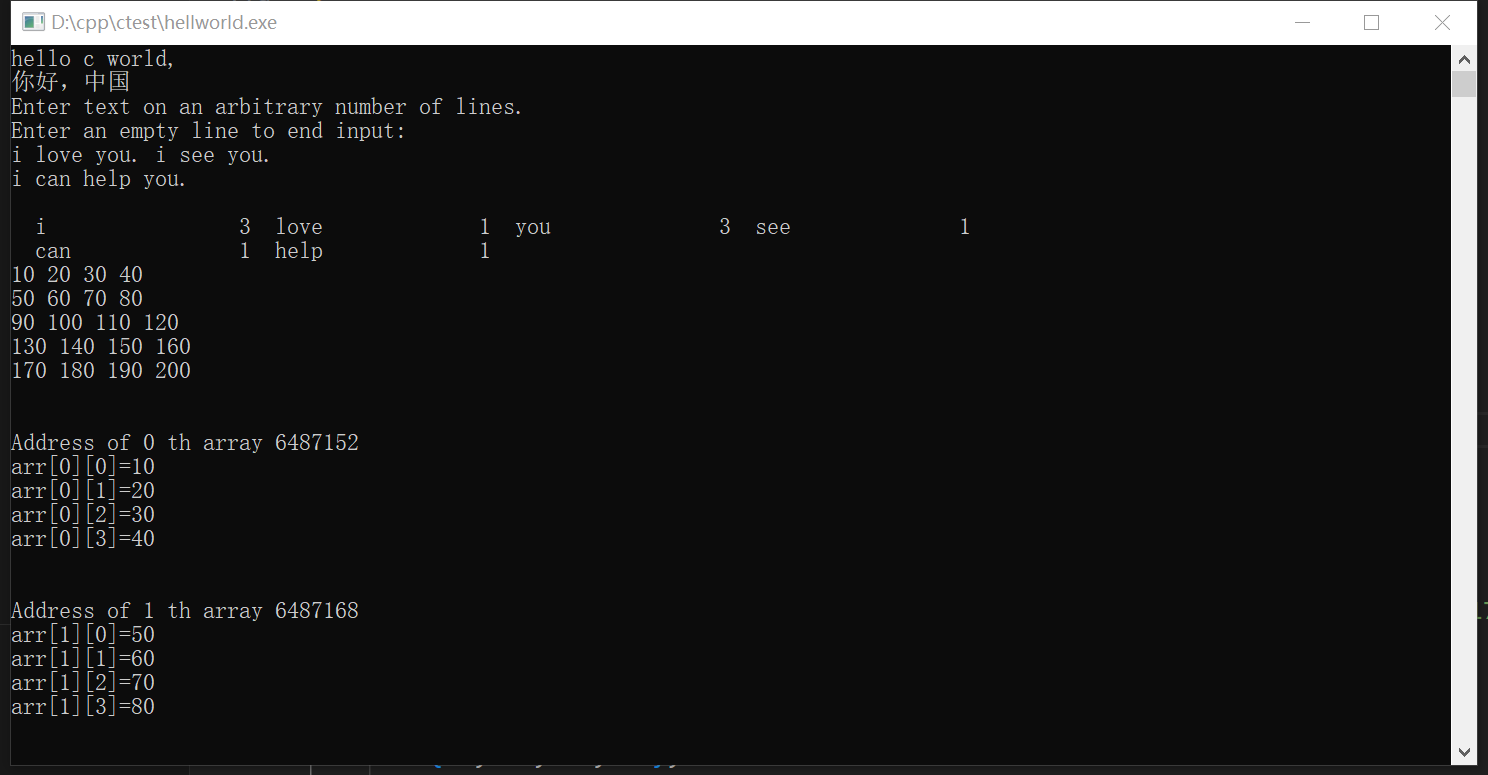c: Analyzing text in window and Ubuntu
Ubuntu 22.4:
/** * @file AnalyzingText.h * @brief Analyzing text * @author geovindu,Geovin Du,涂聚文 (geovindu@163.com) * ide: vscode c11,c17 Ubuntu 22.4 * @version 0.1 * @date 2023-11-05 * * @copyright Copyright (c) 站在巨人的肩膀上 Standing on the Shoulders of Giants 2023 * */ #ifndef ANALYZINGTEXT_H_ #define ANALYZINGTEXT_H_ #include <stdio.h> #include <string.h> #include <stdbool.h> #define TEXT_LEN 10000 // Maximum length of text #define BUF_SIZE 100 // Input buffer size #define MAX_WORDS 500 // Maximum number of different words #define WORD_LEN 12 // Maximum word length /** * @brief 计算英文单词出现的次数 * */ void AnalyText(); #endif
/**
* *****************************************************************************
* @file AnalyzingText.c
* @brief Analyzing text
* @author geovindu,Geovin Du,涂聚文 (geovindu@163.com)
* ide: vscode c11,c17 Ubuntu 22.4
* @date 2023-11-01
* @copyright geovindu 站在巨人的肩膀上 Standing on the Shoulders of Giants
* *****************************************************************************
*/
#include "include/AnalyzingText.h"
/**
* @brief 计算英文单词出现的次数
*
*/
void AnalyText()
{
char delimiters[] = " \n\".,;:!?)("; // Word delimiters
char text[TEXT_LEN] = ""; // Stores the complete text
char buf[BUF_SIZE]; // Stores one input line
char words[MAX_WORDS][WORD_LEN]; // Stores words from the text
int nword[MAX_WORDS] = {0}; // Number of word occurrences
int word_count = 0; // Number of words stored
printf("Enter text on an arbitrary number of lines.");
printf("\nEnter an empty line to end input:\n");
// Read an arbitrary number of lines of text
while(true)
{
// An empty string containing just a newline
// signals end of input
fgets(buf, BUF_SIZE, stdin);
if(buf[0] == '\n')
break;
// Concatenate new string & check if we have space for latest input
//strcat_s(text, TEXT_LEN, buf)
size_t tlen=TEXT_LEN;
char *ppd=strncat(text, buf,tlen);
if(strlen(text)==0)
{
printf("Maximum capacity for text exceeded. Terminating program.\n");
return 1;
}
}
// Find the first word
size_t len = TEXT_LEN;
char *duptr = NULL;
//char* pWord = strtok_s(text, &len, delimiters, &ptr); // Find 1st word
//win
//char* pWord = strtok_s(text,delimiters, &duptr);
char* pWord = strtok(text,delimiters);
//strtok(text,delimiters);
// use this line instead, for Microsoft compiler:
//char* pWord = strtok_s(text, delimiters, &ptr); // Find 1st word
if(pWord==NULL)
{
printf("No words found. Ending program.\n");
return 1;
}
//win
//strcpy_s(words[word_count], WORD_LEN, pWord);
strcpy(words[word_count],pWord);
++nword[word_count++];
// Find the rest of the words
bool new_word = true; // False for an existing word
while(true)
{
//pWord = strtok_s(NULL, &len, delimiters, &ptr); // Find subsequent word
//win
//pWord = strtok_s(NULL, delimiters, &duptr);
pWord = strtok(NULL, delimiters);
// use this line instead, for Microsoft compiler:
//pWord = strtok_s(NULL, delimiters, &ptr); // Find subsequent word
if(!pWord)
break; // NULL ends tokenizing
// Check for existing word
for(int i = 0 ; i < word_count ; ++i)
{
if(strcmp(words[i], pWord) == 0)
{
++nword[i];
new_word = false;
}
}
if(new_word) // True if new word
{
//strcpy_s(words[word_count], WORD_LEN, pWord);
// Copy to array
strcpy(words[word_count], pWord);
++nword[word_count++]; // Increment count and index
}
else
new_word = true; // Reset new word flag
if(word_count > MAX_WORDS - 1)
{
printf("Capacity to store words exceeded.\n");
return 1;
}
}
// List the words
for(int i = 0; i < word_count ; ++i)
{
printf(" %-13s %3d", words[i], nword[i]);
if((i + 1) % 4 == 0)
printf("\n");
}
printf("\n");
}
输出:

windows 10
/** * ***************************************************************************** * @file AnalyzingText.h * @brief Analyzing text * @author geovindu,Geovin Du,涂聚文 (geovindu@163.com) * ide: vscode c11,c17 windows 10 * @date 2023-11-01 * @copyright geovindu 站在巨人的肩膀上 Standing on the Shoulders of Giants * ***************************************************************************** */ #define __STDC_WANT_LIB_EXT1__ 1 #ifndef ANALYZINGTEXT_H_ #define ANALYZINGTEXT_H_ #include <stdio.h> #include <string.h> #include <stdbool.h> #define TEXT_LEN 10000 // Maximum length of text #define BUF_SIZE 100 // Input buffer size #define MAX_WORDS 500 // Maximum number of different words #define WORD_LEN 12 // Maximum word length /** * @brief 计算英文单词出现的次数 * */ void AnalyText(); #endif
/**
* *****************************************************************************
* @file AnalyzingText.c
* @brief Analyzing text
* @author geovindu,Geovin Du,涂聚文 (geovindu@163.com)
* ide: vscode c11,c17 windows 10
* @date 2023-11-01
* @copyright geovindu 站在巨人的肩膀上 Standing on the Shoulders of Giants
* *****************************************************************************
*/
#include "include/AnalyzingText.h"
/**
* @brief 计算英文单词出现的次数
*
*/
void AnalyText()
{
char delimiters[] = " \n\".,;:!?)("; // Word delimiters
char text[TEXT_LEN] = ""; // Stores the complete text
char buf[BUF_SIZE]; // Stores one input line
char words[MAX_WORDS][WORD_LEN]; // Stores words from the text
int nword[MAX_WORDS] = {0}; // Number of word occurrences
int word_count = 0; // Number of words stored
printf("Enter text on an arbitrary number of lines.");
printf("\nEnter an empty line to end input:\n");
// Read an arbitrary number of lines of text
while(true)
{
// An empty string containing just a newline
// signals end of input
fgets(buf, BUF_SIZE, stdin);
if(buf[0] == '\n')
break;
// Concatenate new string & check if we have space for latest input
if(strcat_s(text, TEXT_LEN, buf))
{
printf("Maximum capacity for text exceeded. Terminating program.\n");
return 1;
}
}
// Find the first word
size_t len = TEXT_LEN;
char *ptr = NULL;
//char* pWord = strtok_s(text, &len, delimiters, &ptr); // Find 1st word
char* pWord = strtok_s(text,delimiters, &ptr);
// use this line instead, for Microsoft compiler:
//char* pWord = strtok_s(text, delimiters, &ptr); // Find 1st word
if(!pWord)
{
printf("No words found. Ending program.\n");
return 1;
}
strcpy_s(words[word_count], WORD_LEN, pWord);
++nword[word_count++];
// Find the rest of the words
bool new_word = true; // False for an existing word
while(true)
{
//pWord = strtok_s(NULL, &len, delimiters, &ptr); // Find subsequent word
pWord = strtok_s(NULL, delimiters, &ptr);
// use this line instead, for Microsoft compiler:
//pWord = strtok_s(NULL, delimiters, &ptr); // Find subsequent word
if(!pWord)
break; // NULL ends tokenizing
// Check for existing word
for(int i = 0 ; i < word_count ; ++i)
{
if(strcmp(words[i], pWord) == 0)
{
++nword[i];
new_word = false;
}
}
if(new_word) // True if new word
{
strcpy_s(words[word_count], WORD_LEN, pWord); // Copy to array
++nword[word_count++]; // Increment count and index
}
else
new_word = true; // Reset new word flag
if(word_count > MAX_WORDS - 1)
{
printf("Capacity to store words exceeded.\n");
return 1;
}
}
// List the words
for(int i = 0; i < word_count ; ++i)
{
printf(" %-13s %3d", words[i], nword[i]);
if((i + 1) % 4 == 0)
printf("\n");
}
printf("\n");
}
输出:

哲学管理(学)人生, 文学艺术生活, 自动(计算机学)物理(学)工作, 生物(学)化学逆境, 历史(学)测绘(学)时间, 经济(学)数学金钱(理财), 心理(学)医学情绪, 诗词美容情感, 美学建筑(学)家园, 解构建构(分析)整合学习, 智商情商(IQ、EQ)运筹(学)生存.---Geovin Du(涂聚文)



 浙公网安备 33010602011771号
浙公网安备 33010602011771号